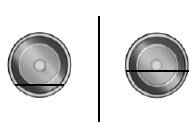Driving through water
WARNING: Drive through water in an emergency only, and not as part of normal driving.
WARNING: Engine damage can occur if water enters the air filter.
Note: Driving through deep water may allow water into the transmission or air intake and can cause internal vehicle damage or cause it to stall.
Note: Once through the water, always dry the brakes by moving your vehicle slowly while applying light pressure on the brake pedal.
If driving through deep or standing water is unavoidable, proceed very slowly. Never drive through water that is higher than the bottom of the wheel rims (for cars) or the bottom of the hubs (for trucks).

When driving through water, traction or brake capability may be limited. Also, water may enter your engine’s air intake and severely damage your engine or your vehicle may stall.
Wet brakes do not stop the vehicle as quickly as dry brakes.
See also:
All-Wheel Drive (If Equipped)
All wheel drive
USING YOUR ALL-WHEEL DRIVE (AWD) SYSTEM (IF EQUIPPED)
AWD uses all four wheels to power the vehicle. This increases traction, enabling
you to drive over terrain and road conditions ...
Pairing your phone for the first time
Note: SYNC can support downloading up to approximately 2000 entries per
Bluetooth-enabled cellular phone.
Note: Make sure the vehicle ignition and radio are turned on and the transmission
is in p ...
Tire care
Information About Uniform Tire Quality Grading
Tire Quality Grades apply to new pneumatic passenger car tires. The Tire Quality
Grades can be found where applicable on the tire sidewall between t ...
